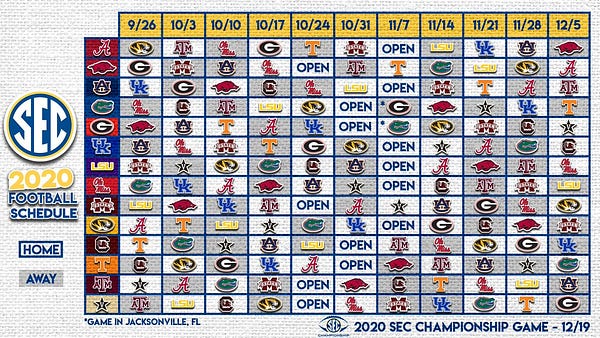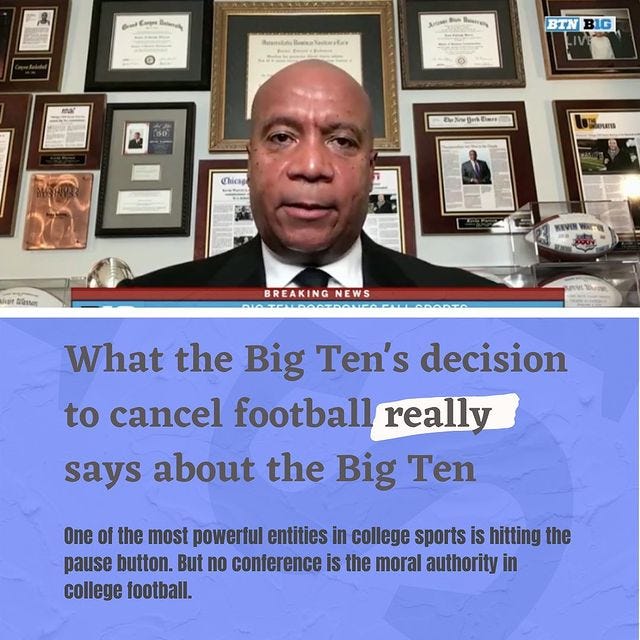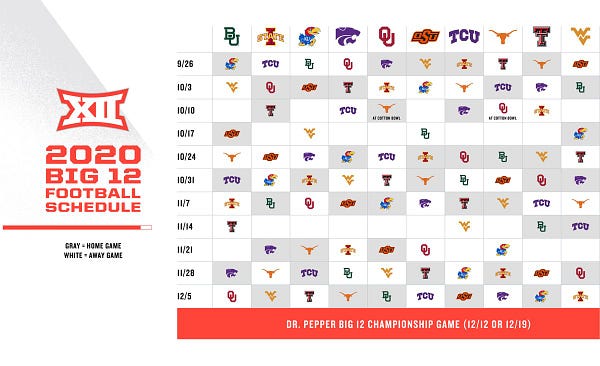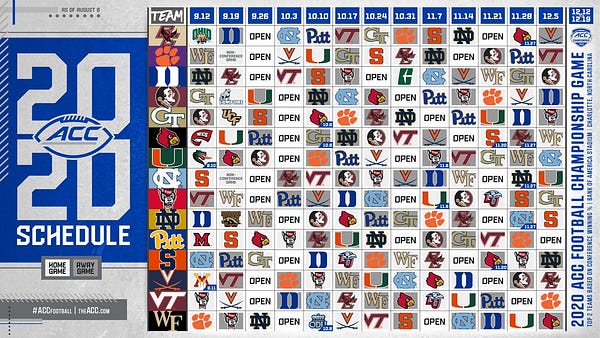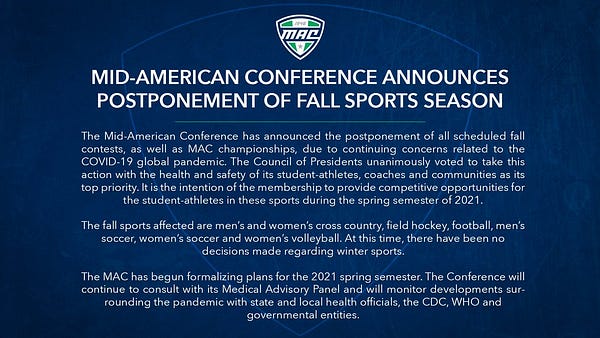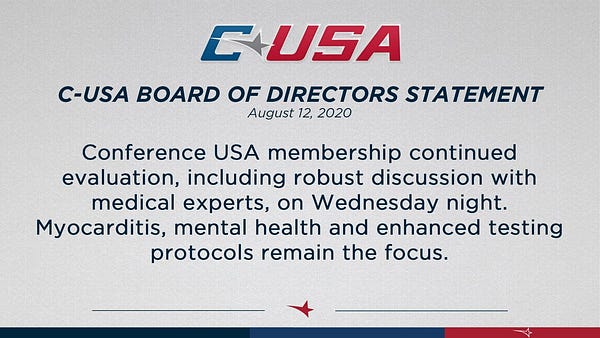Here is every FBS conference's explanation for what it's doing about football
This is what everyone's saying publicly.
It’s Tuesday, August 18 and there’s anything but consensus between the decision-makers in college football about what, exactly, comes next.
Last week, some conferences decided to scrap fall sports for 2020, hoping to attempt another go in spring 2021. But other leagues are tiptoeing to the starting line with a try at a fall season, if maybe one that’s pushed back a few weeks. This comes even as the NCAA’s top doctor says, "Right now, if testing stays at it is, there's no way we can go forward with sports."
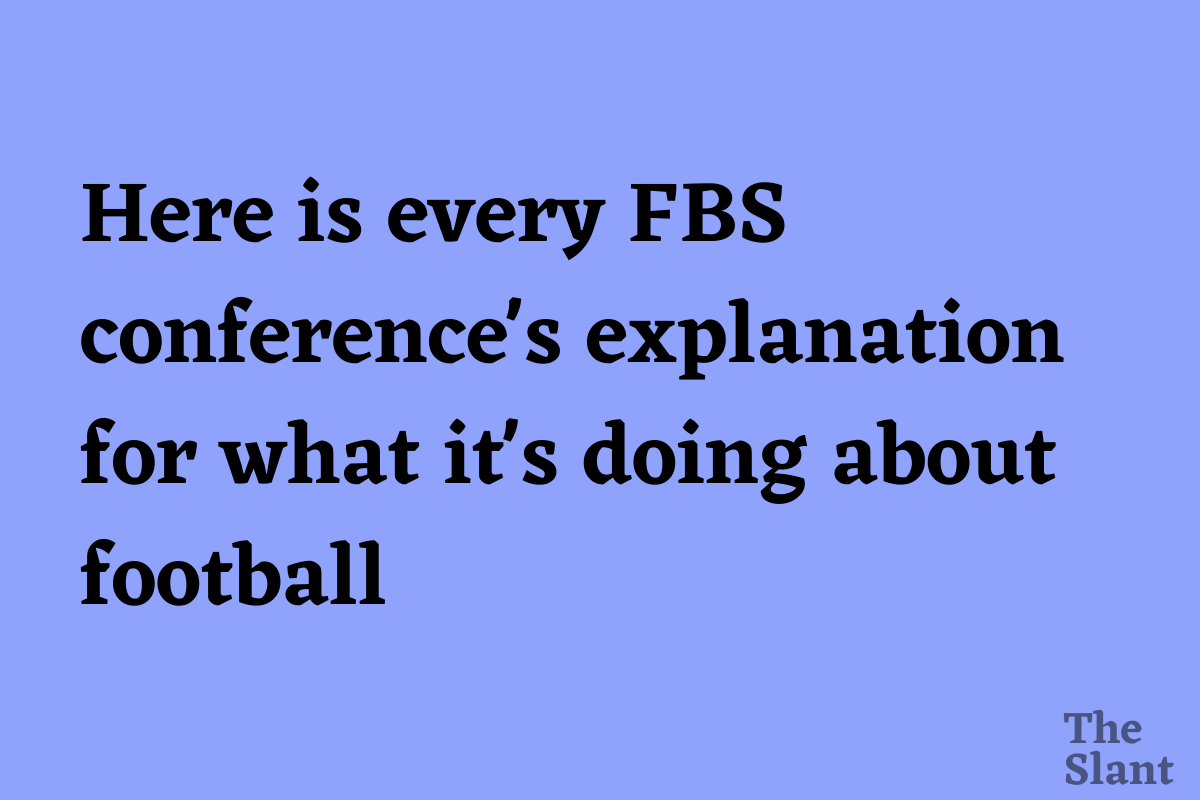
SEC: Obviously we’re gonna try this
The decision: The SEC released its full 10-game schedule on Monday. The conference is scheduled to start play on Sept. 26.
The public reasoning, according to one medical expert on its advisory panel: “I would say we have seen enough to develop a safe plan. [Other conferences] have not,” Dr. Catherine O’Neal, an infectious diseases expert and assistant professor at LSU’s Health Sciences Center, told The Athletic. “Our plan was earlier. Our plan was based on an experience that they had not had yet. And we implemented that plan faster than they did for that reason, so we could prepare for this. So we feel confident in our plan. I think our football teams can absolutely get through this. I think our athletic departments can absolutely get through this. I worry about our community and outside forces that we can’t control.”
Notable here: O’Neal says the SEC had an advantage of being exposed to the virus earlier than other conferences, but the Pac-12 was clearly the first conference exposed.
“I can’t speak for the other medical task forces, but from our perspective, our questions have been very cautious about what is happening today and what’s happening the next couple of weeks,” O’Neal told Sports Illustrated’s Ross Dellenger. “We haven’t dared to address what’s happening in a month or two months. We say that every time we meet: ‘Things are going to change so rapidly. Let’s proceed cautiously and re-evaluate.’”
SEC officials have publicly maintained that no season is guaranteed. Here’s conference commissioner Greg Sankey last week:


Big Ten: “Uncertainty” is the key word
The decision: The Big Ten was the first of the five power conferences to postpone its 2020 season. Commissioner Kevin Warren was vague on the precise reasoning for canceling the season when he appeared on the Big Ten Network last week, though the big-picture reasons for not playing football during this pandemic do seem obvious.
The reasoning: “A lot of the questions that we need to make sure that we have answered,” Warren told BTN’s Dave Revsine, “now that we were getting closer to really going to the next phase of practice and getting closer to actually compete, to have competition, is that there are just too many uncertainties to feel confident from a medical standpoint to proceed forward.”
Warren, later on:
“Based on the uncertainty surrounding the medical situation and having our student-athletes compete in fall sports, we just did not think it was prudent at this time,”
And again:
“There’s so much uncertainty,” Warren said. “As we ask questions, two weeks ago some questions were answered. But then you ask more questions and then maybe those questions are answered but then there’s new questions. And then you ask questions even today. And that’s not only in the Big Ten. That’s across the country and the world.”
And in the conference’s official statement:
“As time progressed and after hours of discussion with our Big Ten Task Force for Emerging Infectious Diseases and the Big Ten Sports Medicine Committee, it became abundantly clear that there was too much uncertainty regarding potential medical risks to allow our student-athletes to compete this fall.”
Warren said on BTN that myocarditis was not a “major factor” in the conference’s decision.
Pac-12: We’re out and we’re happy to tell you why
The decision: The Pac-12 postponed all sports through the end of the calendar year. While the Big Ten has started to receive some heat for the processes it used to decide to cancel the season, the Pac-12 hasn’t. The Pac-12 doesn’t have the same rapid fanbases that the Big Ten does, but that’s not the only reason things have gone smoothly out West. The Pac-12 kept coaches and ADs in the loop and clearly explained their reasons for postponing the season. That meant no schools getting Mad Online and attempting to defy conference rules, if only perhaps to score points with their fans.
The reasoning: “We came to the conclusion, reluctantly, that there’s no indication that things are likely to change in terms of the criteria that influenced this in the next few weeks,” Pac-12 commissioner Larry Scott said.
The Pac-12 also released the medical guidance it relied upon to make its decision, outlining specifically three “concerning medical issues.”
1. Community prevalence remains very high in much of the Pac-12 footprint and traveling to many places is likely unsafe, particularly on commercial aircraft.
2. We are concerned about health outcomes related to the virus. Among these, there is new and evolving information regarding potential serious cardiac side effects in elite athletes. We do not have enough information to understand the short and long-term outcomes regarding these health issues.
3. Testing capacity needs to increase to allow for more frequent testing, performed closer to game time, and with more rapid turn-around time to prevent spread of infection and enhance the safety of all student-athletes, coaches, and staff involved, particularly in situations where physical distancing and mask wearing cannot be maintained. This will require access to significant capacity of point-of-care testing and rapid turn-around time, which is currently very limited.
At The Athletic, Bruce Feldman dives a bit further into the decision ($).
Big 12: Everything seems fine to us
The decision: The conference was reportedly “split” on a decision last week, but announced on Wednesday a tentative plan to stage a season. The Big 12 is proceeding with a “9+1” schedule, meaning each team will play nine conference games and one nonconference game. Conference games are scheduled to begin Sept. 26.
The reasoning: "The biggest argument [for playing] is that nobody has told us that it's poorly advised to go forward and do what we are doing," Big 12 commissioner Bob Bowlsby told reporters last week. "If we get to the place where our doctors and scientists say, 'You know what? You guys have two wheels off the tracks and you're headed for a train wreck,' we will pivot that day. If it's during camp, it's during camp. If it's during October, it's during October. If it's the week before our championship game, that's when it is."
ACC: We’re playing, and we’re bringing a special friend
The decision: Staging a season beginning on Sept. 10 with each team playing 10 conference games. The league is letting teams host nonconference games, but is not allowing teams to play nonconference games on the road. Also, Notre Dame is officially an ACC football team for this season only.
The reasoning: “We believe we can mitigate it down to a level that makes everyone safe,” Dr. Cameron Wolfe, a Duke infectious disease specialist and chair of the ACC’s medical advisory panel, told Sports Business Daily. “Can we safely have two teams meet on the field? I would say yes. Will it be tough? Yes. Will it be expensive and hard and lots of work? For sure. But I do believe you can sufficiently mitigate the risk of bringing COVID onto the football field or into the training room at a level that’s no different than living as a student on campus.”
Independents: Either “no chance” or “of course we’re playing”
Army: Hoping to play seven home games, plus on the road at Tulane and Army-Navy in Philadelphia.
BYU: Planning on playing, but only have five games scheduled so far.
Liberty: Has eight games scheduled.
New Mexico State: Canceled its 2020 season.
UMass: Canceled its 2020 season
UConn: Canceled for 2020.
AAC: We’re not canceling until the other conferences do
The decision: The American Athletic Conference is scheduled to have each team play an eight-game conference schedule starting on Sept. 19, with nonconference games up to the discretion of individual schools.
The reasoning: “We’ve decided it would be premature to make any kind of decision at this point on such an important matter,” AAC commissioner Mike Aresco told the Orlando Sentinel last week. “We’re continuing to gather information and there is more information coming out.
Later in the interview, he said:
“We think there is potentially a safe way to proceed; our medical advisory group feels that way And I understand now the Big 12 is still willing to try moving ahead and that would mean three [autonomous] conferences are saying that with the ACC, SEC and Big 12. We’ll see what happens.
“Right now, there isn’t a need to make any decision.”
Mountain West: LOL nope.
The decision: The Mountain West was the second FBS conference to postpone football, doing so on Monday, August 10.
The reasoning: “We were hopeful we could carefully and responsibly conduct competition as originally scheduled with essential protocols in place,” commissioner Craig Thompson said in a press release. “However, numerous external factors and unknowns outside our control made this difficult decision necessary. I fully understand the impact of this outcome on our student- athletes, coaches, administrators and staff who work so hard daily to play the sports we all love, and I share in their disappointment. We will continue to navigate this pandemic together, overcome the obstacles and return to intercollegiate athletics at the earliest opportunity.”
MAC: Without that Big Ten money, what’s the point?
The decision: The MAC was the first FBS conference to announce it would be punting on football this fall, doing so on Saturday, August 8.
The reasoning:
Conference USA: Can’t hear you! We’re still doing it!
The decision: Conference USA is “staying the course,” a source told the Denton Record-Chronicle last week. This comes after conference member Old Dominion canceled its season and Rice pushed its start date back.
The reasoning: Not anything substantive yet.
Sun Belt: Pretty normal football season happening here, don’t worry about it
The decision: The Sun Belt is planning on starting its season on the customary Labor Day weekend, the conference announced back on Aug. 4, its most recent statement on the matter. Each team will play eight conference games with the option to have up to four nonconference games, both of which are the conference’s usual number.


The reasoning: This official statement is all I can find: “The Sun Belt Conference will continue to monitor health trends across our communities. Sun Belt Presidents and Chancellors, Athletics Directors, the COVID-19 Advisory Panel, and medical advisors will continue to review data to ensure a safe return to activities and competition. Our data review will cross seven states and 12 counties and include, among other things, infection rates, hospitalization rates, local health directives, advancements in COVID-19 testing and campus, department and team health trends. “

